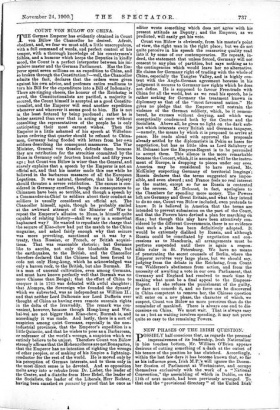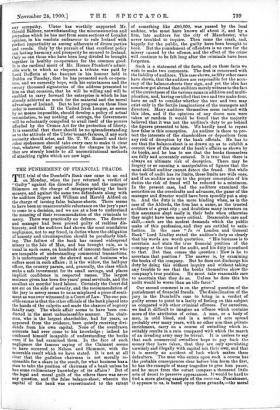NEW PHASES OF THE IRISH QUESTION.
POSSIBLY half-conscious that, as regards the personal impressiveness of its leadership, Irish Nationalism in him touches bottom, Mr. William O'Brien appears desirous of cutting something of a dash at the outset of his tenure of the position he has clutched. Accordingly, within the last few days it has become known that. so far as his influence goes, Irish M.P.'s will ignore the Decem- ber Session of Parliament at Westminster, and occupy themselves exclusively with the .work of a "National Convention," tile assembling of which in Dublin, on the 1 1 th of next month, had been previously arranged. To that end the "provisional directory" of the United Irish' League had a special meeting on Tuesday, and unani- mously adopted, on Mr. O'Brien's motion, a lengthy resolution which, from the quality of its language, was plainly of his devising, in form as well as in substance. Its concluding passage presses upon the newly elected Nationalist Members the view that "abstention from any participation in the proceedings of the British criminals would best befit the dignity of our own country, and would best express our abhorrence of England's guilt" (in the South African War), "while leaving the representatives of Ireland at leisure to complete the work of united and disciplined national organisation which alone can extort England's respect in the future, and enable Ireland to be effectively represented when the real work of Parliament commences next February." This language, we notice, raises the gorge of the Westminster Gazette, and is indeed regarded by that paper as illustrating the impossibility, as things are, of an alliance between the Irish Nationalists and the British Liberals; but would Sir Henry Campbell- Bannerman say so ? Would he deem it more than a distressing symptom of the temper naturally induced by Mr. Chamberlain's methods of diplomacy and of elec- tioneering, coupled with the obstinacy of Unionist resistance to Irish Nationalist aspirations? If be would, some early opportunity of criticism may doubtless present itself. That, however, is by the way. We have no criticisms for Mr. O'Brien's style. C'est l'hAmme. But what is involved in that completion "of the work of united and disciplined national organisation," from which Irish M.P.'s are not to be diverted by the comparatively unimportant functions which they could be discharging in December at Westminster ? Prin- cipally, as we gather, the annihilation of Mr. Healy. Some ten days ago, in a speech at Westport, Mr. O'Brien called upon Mr. Redmond, as chairman of the approaching Nationalist Convention, to accept a resolution for the expulsion of Mr. Healy from the Irish party. This puts Mr. Redmond in a somewhat difficult position. He has swallowed the programme and policy of Mr. O'Brien's United Irish League, and a few days ago was engaged with Mr. Dillon in dodging the police round some villages in Wicklow, in order to hold a meeting which Mr. Gerald Balfour had very properly proclaimed, as being intended to promote the intimidation of certain individuals. But, on the other hand, he must know perfectly well, no one better, that in the field of Parliamentary work Mr. Healy, on a moderate computa- tion, is worth ten of Mr. O'Brien, and that to drive him out of the Nationalist party would be to deprive that party of the most efficient exponent of its point of view in connection with Irish legislation. That being so, Mr. Redmond must quite fully recognise the force of the objection raised by Mr. Timothy Harrington and Mr. Patrick O'Brien at a meeting in Dublin last week to his giving any countenance from the chair of the Nationalist Convention to an attempt to ostracise Mr. Healy. When, moreover, that objection is enforced, as it was in Mr. Har- rington's case, by a threat that if it were disregarded he would appeal to his constituents, and go into opposition to Mr. Redmond, that politician cannot help seeing that, even from the point of view of outward harmony, the excom- munication of Mr. Healy is likely to prove a costly and dangerous measure. Mr. Harrington was one of those most actively concerned a year ago in bringing about the temporary success of the " Unity " Conferences, and the strong line he is now taking is, therefore, the more significant as to the distrust and resentment excited in independent quarters by Mr. William O'Brien's attempt to establish a boss-ship.
In any case, whether or not Mr. Redmond is weak enough to put, and whether or not the Nationalist Con- vention is subservient enough to pass, a resolution casting him out of the Nationalist party, we may be pretty well assured that Mr. Healy himself will not accept his own extinction. Not impossibly, even while Mr. William O'Brien is engaged in elaborate attempts to crush him in Dublin, Mr. Healy may be found availing himself of some opportunity at Westminster to illustrate those remarkable Parliamentary gifts of his to which Mr. Patrick O'Brien referred in his protest against the ex- clusionist policy advocated by Mr. William O'Brien and Mr. Dillon. Such an opportunity may, perhaps, present itself in connection with Mr. T. W. Russell's new propa- ganda for the compulsory expropriation of all the land- lords of Ireland. Mr. Russell, in announcing his retire- ment from the post which he held as Parliamentary Secretary of the Local Government Board, by reason of the Prime Minister's inability "in present circumstances" to give countenance to his expropriation project, intimated that he should use his independence in and out of Parlia- ment to render the continuance of the present land system "impossible," and to "fight to the death" against landlordism. We wish to render all respect to the dis- regard of selfish considerations which Mr. Russell has shown in giving up his position and prospects as a member of the Government, and to give full recognition to the strength of his convictions as to the necessity for a termination of the system of dual ownership. Neverthe- less, we cannot but regret the course which he has thought it his duty to take, both for itself and for the influence which it is likely to exercise upon the general tone of agrarian agitation in Ireland. Until the other day there was no reason to regard the general agrarian situation in Ireland as of an anxious character. The United Irish League has grown to its present strength by exploiting the hardships of the small tenants of the more crowded tracts in the West. Those hardships are undeniable and deeply to be regretted, but they are being dealt with, gradually indeed, but on sound and safe lines, by the Congested Districts Board, to the investigation of whose work Mr. George Wyndham has wisely given his immediate personal atten- tion, on his appointment to succeed Mr. Gerald Balfour as Chief Secretary. It has hardly been alleged that the great body of Irish tenant-farmers, enjoying as they do perfect security of tenure at rents fixed by the Land Courts, and having lately gathered in a good harvest, were in a condition of privation or were suffering from injustice. If there had been any pretext for such a contention, it would, we may be sure, have been trumpeted up and down the country. Nothing of the kind, was generally done, but this time the initiative towards a national agitation has come from Ulster, and it has been led, if not inspired, by Mr. T. W. Russell. He has taken up the question mainly on the ground that the Land Courts are dis- trusted, and, as he appears to maintain, rightly distrusted, by the tenants, although it is notorious that the landlords generally have never resented more bitterly than at present what they regard as the injustice done to their interests by the same tribunals. The plain man would be apt to regard these opposing allegations of inequitable working on the part of the Courts as going far to neutralise one another. They may, indeed, also be con- sidered as affording evidence of the essentially unsatis- factory character of any legal machinery for determining justice as between landlord and tenant, and possibly as a discouragement to all legislative interference in the domain of free contract between man and man. But the Ulster tenant - farmers may fairly be re- minded that it was very largely in deference to their views that the Land Act of 1881, embodying the "Three F.'s," was framed and passed, and has by later legislation been extended in the scope of its operations. Surely it seems rather early days for them to be coming to Parlia- ment already, long before the lapse of a generation, to condemn as hopelessly unworkable the great economic and legislative experiment which was undertaken at their instance. In theory, we are a good deal inclined to agree with them, and to hold that in the long-run dual owner- ship of land is unlikely to work altogether well under any system of Courts ; but, as it seems to us, very much more proof will be required of that fact than the prevalence among the tenant-farmers of one province of the feeling that they have been less liberally dealt with by the Land Commissioners for a year or so than they used to be.
Of course, it is open to the Ulster tenant-farmers to organise themselves, and to take all constitutional measures to persuade the Government and the British public that the view put forward by Mr. Russell is correct. But we feel bound to press upon them and on him that the somewhat fierce modes of expression which he has employed are liable to be, and indeed have already been, misinterpreted by Nationalist speakers and writers as holding out anticipations of co-operation, and even leadership, from Ulster in an agitation akin to that of the old Land League, with which the law-abiding and sober inhabitants of the Northern province could never have any sympathy. Ulster has worthily supported Mr. Gerald Balfour, notwithstanding the misconstruction and prejudice which he has met from some sections of Loyalist opinion, in his resolute endeavour to rule Ireland with perfect impartiality as among adherents of divers parties and creeds. Only by the pursuit of that excellent policy can lasting harmony and prosperity be secured to Ireland. Only so can those who have been long divided be brought together in healthy co-operation for the common good. It is the cardinal merit of Mr. Horace Plunkett's admir- able work, to which so eloquent a tribute was paid by Lord Dufferin at the banquet in his honour held in Dublin on Tuesday, that he has promoted such co-opera- tion, and we earnestly hope, with his entertainers and the twenty thousand signatories of the address presented to him on that occasion, that he will be willing and will be enabled to carry forward the enterprise in which he has already achieved so much for the material and the moral advantage of Ireland. But to her progress on those lines order is essential. If the United Irish League, as seems by no means impossible, should develop a policy of actual intimidation, to say nothing of outrage, the Government will be reluctantly compelled to avail itself of the powers afforded by the Crimes Act for the protection of liberty. It is essential that there should be no ivisunderstanding as to the attitude of the Ulster tenant-farmers, if any such necessity should arise, and Mr. T. W. Russell and their other spokesmen should take every care to make it clear that, whatever their aspirations for changes in the law, they are sternly hostile to all unconstitutional methods of attacking rights which are now legal.












































 Previous page
Previous page